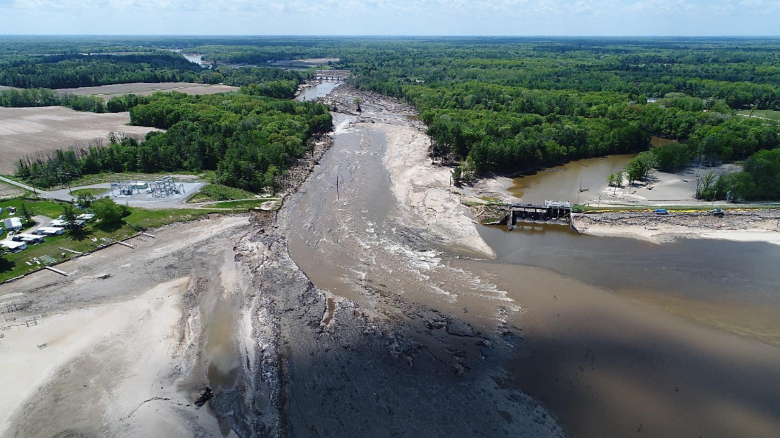The Michigan Attorney General’s Office is planning to pursue a judgment against Lee Mueller, the managing partner of the former owner of the Edenville Dam, over the dam's 2020 failure that caused hundreds of millions of dollars worth of damage. Attorneys say new information brought to light in the federal lawsuit shows Mueller, who worked for Boyce Hydro, the owner at the time of the failure, was aware of the potential for failure at least as early as 2010.
Emails show that Mueller expressed concern in 2010 about the eastern embankment of the 6,000-ft-long dam, which consisted of four earthfill embankments, two gated concrete spillways and a powerhouse. Mueller held a meeting with the dam's safety engineer, Frank Christie, and a consultant, Steve Doret, according to information revealed during the discovery process for the court case.
Christie and Doret agreed with Mueller’s concerns. In October 2012, Doret designed a plan to install sheet piling on the upstream side of the dam from the east end of the dam to the spillways. He also planned for future phases of work that would have replaced the spillways.
The work was never done. Mueller testified that the Federal Energy Regulatory Commission, which had regulated the dam at the time, never explicitly required it. However, attorneys for the state of Michigan say there is no evidence Mueller ever made FERC aware of the concerns about the eastern embankment.
“Instead, Boyce Hydro spent its time and money on non-dam-safety related projects, such as attempting to hold a music festival, designing a marina and RV park, operating a sawmill and trying to develop a residential neighborhood,” attorneys for the state wrote.
Boyce Hydro did build an embankment overlay in 2012 on the western end. In 2014, it placed additional buttress fill in the same location. But it never did anything to strengthen the east end of the embankment, according to the attorney general’s office.
Christie testified that he tried to explain to Mueller the importance of paying attention to the dam and FERC, but that Mueller replied that he was not in the hydro business, but “in the money-making business.” Christie added that he realized Boyce Hydro was not going to take dam safety seriously, and he resigned in protest in 2017.
“We discovered an unconscionable disregard for safety and dam integrity that cost the community that relied on the security of that dam immeasurably, and it’s important we share this with the court today,” Michigan Attorney General Dana Nessel said in a statement.
Neither Mueller nor an attorney representing him and Boyce Hydro immediately responded to inquiries about the case.
The eastern embankment failed in May 2020. It sent a rush of water downstream, which then overtopped the Sanford Dam and flooded hundreds of buildings, forcing the evacuation of thousands of people.
Following the collapse, the Michigan Dept. of Environment, Great Lakes and Energy underwent an emergency project to lower the spillway to restore the natural flow of the Tobacco River. AECOM developed the plan and Midland, Mich.-based Fisher Contracting Co. performed the work. EGLE also facilitated the purchase of the dam by a nonprofit group called Four Lakes Task Force, which plans to rebuild and upgrade the dam. The group expects the work will last into 2025.
Cause of The Failure
An independent investigation later identified static liquefaction as the cause of the failure. Loose soil in the embankment was saturated with water to the point that it lost its integrity, acting like a liquid rather than a solid, engineers found.
A team led by Scott Olson, a civil engineering professor at the University of Illinois Urbana-Champaign, prepared a report for the state and also found that the proposed sheet-pile wall would likely have prevented the failure. Any effort to reduce the static shear stresses in the downstream slope, such as construction of a downstream buttress or a project to increase the spillway capacity, also likely would have decreased the potential for triggering static liquefaction.
The attorney general’s office had initially filed its lawsuit following the failure against Boyce Hydro, along with related companies and Mueller. However, attorneys for the state filed a motion seeking a summary judgment that would dismiss the case against all the defendants other than Mueller. Boyce Hydro filed for Chapter 11 bankruptcy protection in 2020, as it faced numerous lawsuits over the failure, and the attorney general’s office says that the bankruptcy process will channel any funds left in the company’s estate to flood victims.
If the judge agrees to order the judgment dismissing the other defendants, the attorney general’s office says it will pursue a default judgment against Mueller personally.
The case currently has a bench trial scheduled to begin Oct. 23 in Kalamazoo.






